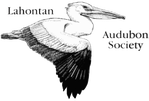The descriptions, maps and directions provided here are based on A Birding Guide to Reno and Beyond, Second Edition, published by the Lahontan Audubon Society in 2007. The print guide can be purchased from our online store. The most current guides can be found here on our website. We are looking for volunteers to help us update our older guides and add guides for newer birding hotspots. For detailed species information and photographs, we recommend visiting All About Birds hosted by the Cornell Lab of Ornithology.
* Recognized by the National Audubon Society as a Nevada IBA. ** The Area lies within a Nevada IBA. New additions since the 2nd edition print Birding Guide was published: Carson City Wastewater Treatment Plant (Carson City) Diamond Creek Pond ( Reno - Southeast) Dorostkar Park (Reno - Northwest) Mayberry Park (Reno - Northwest) For an interactive map about birding hotspots along with bus routes within the Reno/Sparks metropolitan area, please visit our page on the Birding By Bus program. |

|

































